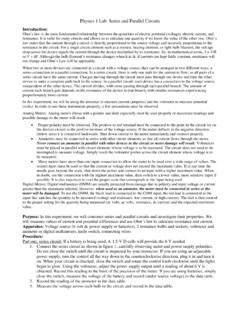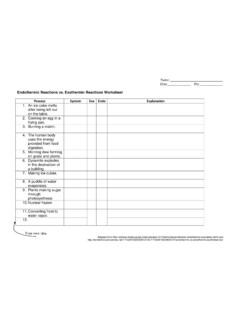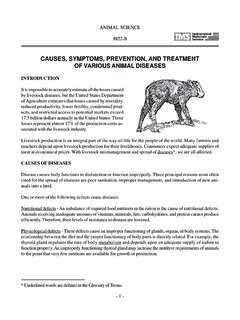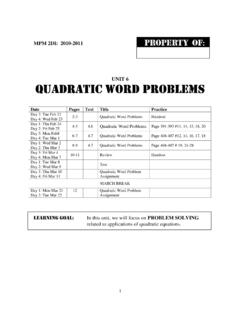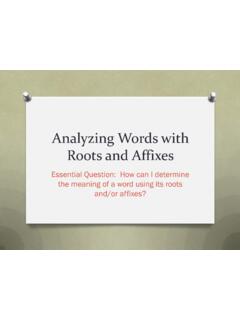Transcription of Political Developments in Europe 1450-1750
1 Political Developments in Europe1450-1750 Objectives* Understand how Spain, Portugal, The Netherlands, France, England, and the nations of Central Europe changed politically during the time period 1450-1750 *Understand the rise of absolutism (absolute monarchs) in EuropeRise of ABSOLUTISM (Absolute Monarchs) in Europe *ABSOLUTISM- Political theory that maintains leaders should have all Political power without limits*Absolute leaders attempt to control all aspects of their empires and demand complete allegiance from subjects- no dissent is tolerated*Often claimed divine rightRise of ABSOLUTISM (Absolute Monarchs) in EuropeWhat factors led to absolutism in Europe ? Late Middle Ages increased the power of kings, decreased the power of popes Renaissance, humanism, Reformation led to increased scrutiny of the Church Decline of feudalism, rise of national kingdoms, urbanization led to increased centralized power Growing middle class supported kings- stable government was good for business Monarchs supported merchants endeavors Constant warfare in Europe - need for protection and support strengthened the influence of kingsSpainSpain s territory in Europe in 1550 Charles V (king of Spain) divided this territory between.
2 -His brother Ferdinand (Austria and the Holy Roman Empire) -His son Philip II (Spain, the Spanish Netherlands, and Spain s American colonies) SpainSpain under Philip II (1556-1598) 1580- Seized Portugal after the Portuguese king died without an heir (Philip II was his nephew)- took control of Portugal s global empire too Great wealth mainly from the American colonies was used to bulk up Spain s army and navy: Wanted to defend Catholicism from Muslims and Protestants 1571: Defeated the Ottoman Empire in a naval battle 1588: Spanish Armada (huge fleet of ships) sent to punish Protestant England (England s queen, Elizabeth I, had supported Protestants who had rebelled against Philip) Superior English warships, armed with long-range cannons, defeated the Armada- led to Spain s declineSpainSpain under Philip II (1556-1598)Spanish ArmadaSpainEven though Spain s Armada was defeated by England, it still appeared to be least for a little while *Philip s grand palace, the Escorial, demonstrated his power and wealth*Monarchs and nobles also used wealth to patronize the arts- led to Spain s Golden Age-Painters: El Greco, Diego Velazquez-Literature.
3 Don Quixote (1605)- often called modern Europe s first novelSpainEl Greco paintingSpainDiego Velazquez paintingSpainThe EscorialSpainWeakening of the Spanish Empire ECONOMIC: Huge influx of silver led to inflation- the value of Spain s currency fell, prices rose = economic decline Also, Spain s population grew, which resulted in more people needing products. More demand= merchants could charge higher prices Expelling of Jews and Muslims in the Inquisition resulted in many talented artisans leaving Spain Spain s nobles didn t have to pay taxes, so the tax burden fell on lower classes (couldn t gain wealth due to this burden) Many Spanish products still produced by guilds using old-fashioned methods, which resulted in high prices. Spanish consumers bought lower-priced goods from Spain s enemies (France, England)SpainWeakening of the Spanish Empire Political Defeat of the Spanish Armada Dutch revolt- break away from Spain in 1579 Religious differences: Spain was Catholic, Netherlands was mostly Protestant Philip raised taxes in Netherlands, tried to end Protestantism Result.
4 Protestant rebellion against Philip Northern provinces became the United Provinces of the Netherlands Southern provinces, mainly Catholic, remained with Spain- would later become BelgiumThe Netherlands As opposed to Spain, the Netherlands, a Protestant country, had a prosperous middle class Practiced religious toleration Not a kingdom, but a republic (each province had an elected governor, whose power depended on support from merchants and landowners) In the 1600s, basically replaced Italy as the banking and trading powerhouse of Europe Like Italy in the 1400s, merchants sponsored artists such as RembrandtThe NetherlandsRembrandt paintingThe NetherlandsRembrandt paintingThe Netherlands Stability of the government in the Netherlands enabled the Dutch economy and middle class to thrive Dutch had the largest fleet of merchant ships in the world by 1636- enabled the Dutch East India Company to successfully monopolize the spice trade in IndonesiaFRANCE From 1562-1598, Catholics and French Protestants (Huguenots) fought each other in religious conflicts Chaotic environment 1572: St.
5 Bartholomew s Day Massacre- sparked a 6 week slaughter of HuguenotsFRANCE 1589: Henry IV, a Huguenot, became King of France Strengthened the monarchy Converted to Catholicism to keep peace in France 1598: Edict of Nantes- granted religious toleration to Huguenots Henry was killed by a religious fanatic in 1610 FRANCE Experience with religious wars and growth in France s Political power led to the development of skepticism in France- a movement that believed nothing can ever be known for certain Religious doubt Questioned old ideas Michel de Montaigne- expressed his ideas in a new form, the essayFRANCE Henry IV s grandson, louis XIV, assumed the throne in 1643 at just 4 years old While growing up, Cardinal Mazarin ruled France Nobles frequently rioted, threatened young king s life When louis XIV took control at 22 (in 1661)
6 , he vowed to become so powerful that the nobles would not be able to challenge himFRANCE louis XIV- The Sun King Said L etat c est moi - I am the state Most powerful ruler in French history Townspeople were weary of fighting in France (both religious and Political )- accepted an absolute ruler as preferable to disorderFRANCELOUIS XIV- THE SUN KING louis XIV weakened the power of nobles by excluding them from his councils Increased the power of government agents called intendants, who collected taxes and administered justice- communicated regularly with them Goal was to help France achieve Political , economic, and cultural brillianceFRANCELOUIS XIV- THE SUN KING Economically, tried to make France self-sufficient by encouraging mercantilism Encouraged people to move to Canada- fur trade added to French wealth Canceled the Edict of Nantes- Huguenots left France in large numbersFRANCELOUIS XIV- THE SUN KING Lived an extremely extravagant lifestyle Had a grand palace constructed at Versailles- demonstrated his wealth Had nobles live with him at Versailles- made them completely reliant on him Patronized the arts, made opera and ballet more popularFRANCELOUIS XIV- THE SUN KING Lived an extremely extravagant lifestyle Had a grand palace constructed at Versailles- demonstrated his wealth Had nobles live with him at Versailles- made them completely reliant on him Patronized the arts.
7 Made opera and ballet more popularFRANCELOUIS XIV- THE SUN KING Lived an extremely extravagant lifestyle Had a grand palace constructed at Versailles- demonstrated his wealth Had nobles live with him at Versailles- made them completely reliant on him Patronized the arts, made opera and ballet more popularFRANCELOUIS XIV- THE SUN KING Under louis , France was the most powerful country in Europe 1667: France invaded Spanish Netherlands (Belgium), gained new cities 1672: Invaded Dutch Netherlands, failed when the Dutch released the dikes, flooding the countrysideFRANCELOUIS XIV- THE SUN KING 1680s: Other European countries (England, Spain, Sweden, Austria) banded together to form the League of Augsburg to oppose France By this time, France was weakened by poor harvests and heavy taxation put on the people to finance warsFRANCELOUIS XIV- THE SUN KING 1701-1714: War of Spanish Succession 1700: Childless king of Spain had died.
8 Promised throne to louis XIV s grandson Other European nations fought France to prevent it from becoming too powerfulFRANCELOUIS XIV- THE SUN KING 1701-1714: War of Spanish Succession 1714: Treaty of Utrecht was signed- louis s grandson could stay king of Spain as long as the thrones of Spain and France were not united Britain won big: got Gibraltar and an asiento (permission from Spain to send African slaves to the Americas); Britain also got some French territories in North America like Nova Scotia and the Hudson Bay region louis XIV died in 1715 to cheers from his own people after he had brought suffering to FranceENGLAND In England, rulers had more barriers to becoming absolute monarchs Had to deal with Parliament- since Parliament controlled England s treasury, frequent conflict between the monarch and Parliament over money After Elizabeth I s reign (1558-1603), England was firmly Protestant (Anglican Church) Many in England wanted the Anglican Church to abandon Catholic-inspired rituals.
9 These people were called Puritans (wanted to purify the Anglican Church)- led to religious tension Like the rest of Europe , warfare was a constant theme in England during the 16th-18th centuriesENGLAND 1625- Charles I took the throne Wanted money to fight Spain and France 1628: Parliament refused to grant him money until he signed a document called the Petition of Right which acknowledged: He would not imprison subjects without due cause He would not levy taxes without Parliament s consent He would not house soldiers in private homes He would not impose martial law in peacetime Charles I agreed to the Petition of Right, then ignored it Still, the idea was important: the law was higher than the king 1629: Charles I dissolved Parliament, raised money by imposing more fines on the peopleENGLAND Charles I became very unpopular Angered Puritans by keeping rituals in the Anglican Church, tried to force Presbyterian Scots to accept the Anglican prayer book- Scots rebelled, threatened to invade England 1641: Parliament passed more laws to limit royal power.
10 Charles I tried to have Parliament leaders arrested England was now split between Royalists (loyal to Charles) and Puritan supporters of ParliamentENGLAND 1642-1649 English Civil War Puritans fought Royalists Oliver Cromwell, a Puritan general, proved to make the difference- Puritans won 1649: Charles found guilty for treason against Parliament, executed (first public execution of a monarch)ENGLANDENGLANDOLIVER CROMWELL S RULE (1649-1658) Disbanded Parliament and the monarchy- established a commonwealth (a republican form of government) with a written constitution (the first written constitution of any European state)- later ignored it Cromwell became a military dictator Ireland, which had been colonized by England since the 1100s, held an uprising- Cromwell crushed it Sought Puritan reforms of society.

